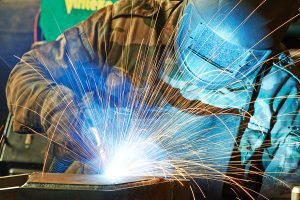Skilled Trades Lead to Thriving Careers in Welding and Fabrication
Skilled fabricators and welders are in high demand. If you’re considering your next career move, transitioning to a skilled trade can pave the way for long-term success. With trade school or on-the-job training as strong starting points, a career in welding and fabrication offers a promising future.

Why Consider Welding and Fabrication?
While all skilled trades are in high demand, job growth in welding and fabrication is especially strong. Welding is an important skill to various industries, from large-scale structural steel projects to the intricate fabrication needed in aerospace technology.
Once you have completed your training, you will not have any trouble in finding a rewarding job. The earning potential for welders is high, and it’s a creative outlet that brings a lot of job satisfaction. On average, a welder who is new to the field can begin making $20-25/hr, with the opportunity to double that salary as you build your skills, gain experience, and acquire additional certifications. Many fabrication shops are committed to investing in their employees and will offer competitive salaries and benefits, along with training their welders to advance through the ranks.
In addition to the job security and compensation benefits, welding is extremely rewarding and fulfilling work. There is deep satisfaction in creating tangible results and using technical skills to produce something so vital to so many industries. Although welding has many technical and scientific elements, there is also an art to metal work. Your expertise as a welder has a direct result to the strength and resilience of structures and building components. If you enjoy seeing something come together from pieces to completion, you will enjoy your work in welding and fabrication. As you grow in your career, you can choose to specialize in different welding techniques and industries, forging your own path.
Trade Schools and On-the-Job Training
There are two main paths to beginning a career in welding and fabrication. The first option is to go through a trade school. Once you have a high school diploma or GED, a trade school will take you through specialized classes and training. Rather than a general education, your training will be focused on your craft, combining classwork and hands-on learning. Once you finish your program in welding, which will usually take 1-2 years, you will have the opportunity to get certified as a welder, making you very marketable to fabrication shops. Trade schools typically offer job placement assistance. Many of those who go through a welding program at a trade school are able to start working right away after completion. While this does involve an initial investment in classes, there are financial aid options available, and flexible class schedules will allow you to work while training for your new career.

On the Job Training
Many quality fabrication shops who are committed to investing in the next generation of welders will offer apprenticeships for those who are just getting started. As an apprentice, you will learn the craft from an experienced mentor and focus on practical skills. One of the greatest benefits of going this route is the ability to “earn while you learn”. Rather than investing in classes, you can start working right away, with your salary increasing as you gain skills, put in the hours, and pass the certification exams. Finding an apprenticeship opportunity will take more legwork than simply registering at a trade school. If this route is more appealing, you will need to research fabrication shops and potential apprenticeships in your area.
Getting Started in Welding and Fabrication
Trade schools and apprenticeships can both lead you to a successful and satisfying career if you are interested in welding and fabrication and have the right aptitude. When employers and welding shops are hiring, they look for several key skills and qualities. These include things like manual dexterity, problem solving skills, safety awareness, and the ability to follow instructions. Welders and fabricators also need to have adequate math skills, as there are many calculations that go into the process. Honing your ability to read and understand a blueprints will also be a skill you’ll acquire. While many of these can be taught, fabrication shops will also look for these qualities that will indicate future success.
There are many resources for aspiring welders and fabricators to research before deciding if this career is the right choice. The American Welding Society (AWS) is a national organization for welders that offers guidance and support to those who are considering a career in welding, as well as those who are already in the field.
Choosing a career in the skilled trades, particularly welding, can set you on a long-term path to success. With the right fabrication shop, you will not simply have a job, but can build a rewarding career, becoming part of a team that will value collaboration, innovation, and excellence. You will be able to get started quickly, build new skills, and rise through the ranks to shape the future of welding and fabrication. We are always looking for talented, creative people to join our team. If you’re interested in learning more about job opportunities at Swanton Welding Co., contact us right away!
